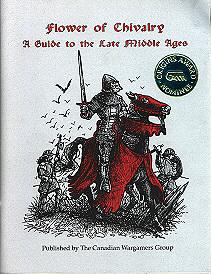
Flower of Chivalry
Late Middle Ages (1297 to 1485). This booklet is both an introduction to the period, a collection of scenarios,
and a rule system. Background material includes description of weapons and tactics, a definition of chivalry, and a brief explanation of heraldry.
The rules are brief (4 pages of rules, 2 pages of tables) and easily learned. Figures are organized into units, which in turn make up larger units (Battles). There is a leader for each Battle, plus an overall army commander. Each turn, the player assigns an Aggression Level (Rash, Bold, Cautious, Defensive, and Prudent) to each Battle leader, then rolls (based on Aggression) to determine that leader's orders for the turn. Orders limit the range of actions available; the drawing of cards determines the total number of actions per side. Leaders accumulate a growing Battlelust rating as their units performs actions, increasing their exhaustion and
limiting their actions. Rules also cover command control, missile and melee combat, bombards, handgunners, and personal challenges.

Each scenario includes historical background, briefings for each player, army lists, and a map (gridded into 1' squares). Many scenarios also include a second map illustrating how the units were deployed for the historical battle, biographies of major characters involved, and notes pointing out the significance of the battle from a military history viewpoint. The scenarios cover the Scottish Wars of Independence (Stirling Bridge, Falkirk, Bannockburn, Neville's Cross), Hundred Years War (Crecy, Poitiers, Agincourt, Formigny,
Castillon), and War of the Roses (Mortimer's Cross, Barnet, Tewkesbury, Bosworth Field). A synopsis of each war is provided, as well as a campaign map and suggestions for creating
a campaign.
Army lists are provided for Dane, Saxon, Norman, Franks, Crusaders, Byzantines, Orders of Chivalry, Saracen, Moors, Slavs, English, French, Scots, Welsh, and War of the Roses. There is no points system for rating and comparing armies.
- Designer
- Bruce McFarlane
- Publisher
- Canadian Wargamers Group, The
- Year Published
- 1993
- Status
- In Print
- Contents
- 80-page PDF – requires use of a standard deck of playing cards (not included)
- Scale
| One unit | 500-800 men |
|---|
| One game turn | 20 minutes |
|---|
| One inch | 40 yards |
|---|
| Figure scale | For use with all scales |
|---|
- Basing
One movement tray (suggested size for 15mm figures: 2" deep x 3" wide) holds all of
the stands belonging to one unit. An infantry unit typically
consists of six stands, each holding 1-4 figures; a cavalry unit consists of three stands.
The number of figures per stand, or the size of the stand, does not matter.
Back to RULES DIRECTORY
Areas of InterestMedieval
Renaissance
Featured Hobby News Article
Featured Link
Top-Rated Ruleset
Featured Showcase Article The next Teutonic Knights unit - Crossbowmen!
Featured Workbench Article
Featured Book Review
|
Please sign in to your membership account, or, if you are not yet a member, please sign up for your free membership account.
A Guide to the Late Middle Ages
Editions
First edition was a 76-page booklet Supplements
Official website
|


![]() Virtualscratchbuilder
Virtualscratchbuilder ![]()
![]() is a big fan of the Age of Sail, and these ships really speak to him - he loves transitional eras, and the Anglo-Dutch Wars was one of those.
is a big fan of the Age of Sail, and these ships really speak to him - he loves transitional eras, and the Anglo-Dutch Wars was one of those.![]() Editor in Chief Bill
Editor in Chief Bill ![]()
![]() on 26 October 1997. Last revised by
on 26 October 1997. Last revised by ![]() Editor Julia
Editor Julia ![]() on 2 November 2016.
on 2 November 2016.

